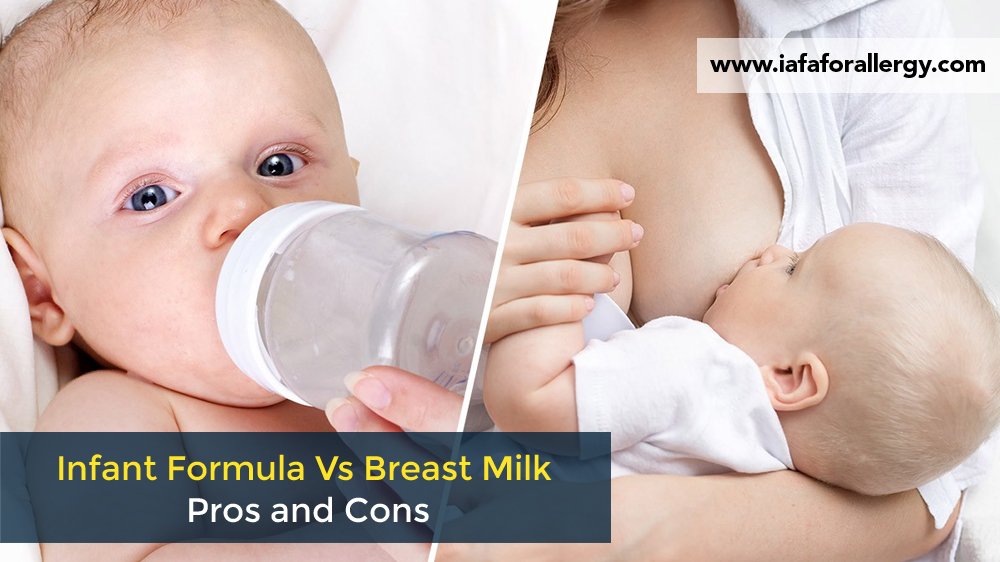The one dilemma that always hits new moms is breastfed or bottle-fed their infants. Which one is best for their baby and them? Scroll down to get the much-needed info and will give you a clear to choose the best option for your infant.
The American Academy of Paediatrics recommends that breast milk is the best choice for a baby up to 6 months. Infants must be exclusively breastfed for the first 6 months. But some women feel uncomfortable feeding their babies in public and some women won’t get sufficient milk to be fed to their infants. So, they prefer baby formula or infant formula as a substitute for their breast milk. But, little they know is that it can’t replace the benefits of breast milk. So, in this article let’s get into detail about the pros and cons of both breast milk and baby formula, and let’s see which is best for your baby and you as a new mom.
About Breast Milk
Breast milk is the natural milk that is available and produced by the mammary glands of human breasts after they give birth. It is the primary source of nutrition for newborn babies. Colostrum is the first milk that is available for the first few months of newborns and later normal milk is available. Lactose is the natural sugar available in breast milk. Breast milk is considered to be the best food for newborn infants and is packed with the required vitamins, minerals, antibodies and carbohydrates essential for the development of the brain and healthy body of an infant.
Pros of Breastfed
- It’s always available and free.
- No need for plastic bottles, or rubber nipples.
- More time-saving as there is no need of preparing the milk and matching the optimum temperature.
- Packed with immunoglobulins like IgG and IgA which are not available in cows’ milk or baby formula.
- The antibodies present in breast milk help in fighting against various infections.
- It has essential vitamins and minerals needed for the growth and development of the baby.
- Can be fed anywhere as no sterilization of bottles and mixing up of baby formula is required.
- Excellent bonding between mother and newborn is bound.
Pros for Infants
- Most resistant to various infections.
- Their immune system will be better developed than the babies who are not breastfed.
- Fewer chances of dying from sudden infant death syndrome.
- Fewer chances of getting development disorders.
- Studies have shown that babies who are breastfed have proper brain development and better intelligence than babies who don’t.
- Colostrum helps in lining the gastrointestinal tract and enhances proper digestion.
- Breast milk is gentle on the baby and is easily digested.
- Less bloating and no constipation in breastfed infants.
- A mother’s intake of food has an impact on the taste of milk, so the baby can experience a different taste of milk.
- Suckling of the milk helps in the movement of muscles of the head and promotes brain development.
Pros for Mothers
- An eternal loving rapport can be developed with your baby.
- A mother has fewer chances of getting breast cancer, ovarian cancer, uterine cancer and heart disease.
- No strain for mothers to prepare baby formula every time to feed their hungry infants. So, saving time and energy.
- Aids in losing weight quickly which is gained during pregnancy.
- Fewer chances of getting postpartum depression.
Cons of Breastfed
- Some women can’t produce enough milk in their bodies due to hormonal imbalances.
- Premature infants need more nutrients than normal babies, so doctors may recommend having baby formula instead of breast milk.
- Some women can’t breastfeed due to some ill conditions, which may pass to the child through the milk.
- Some women find it difficult to breastfeed in public.
About Infant Formula
Infant formula or baby formula is the manufactured food designed to feed the newborn and acts as a substitute for breast milk. It is given to infants of 12 months old. Ingredients of baby formula may vary by brand and also by country but the common ingredients that can be found are cow’s milk whey, casein, fatty acids, emulsifiers, stabilizers, vitamins, and minerals.
Pros of Infant Formula
- No need for a mother’s presence can be given by anyone in the family.
- Manufactured in a way to match human milk. So, the baby’s growth is not reduced.
- It takes more time to digest, so the baby need not be given eatables very often.
- The other partner can help in feeding the baby during nighttime.
- It’s convenient to feed.
- Mother can have her favorite food and need not avoid anything
- No breast discomfort or leaking can be experienced.
- A mother has an idea of the calories that have been given to her child.
- If you are a working mother, you can leave your baby’s formula with the daycare giver. No need to worry about your child’s food.
Cons of Infant Formula
- No other alternative can replace breast milk.
- Immunoglobulins and nutrients found in breast milk can’t be found in cows’ milk.
- Cows’ milk is in a way that suits the calves, not humans.
- Less resistant to infections and diseases.
- Brain and cognitive development are diminished.
- The overall growth of the baby is reduced than the babies who are breastfed.
- More time is consumed due to washing and sterilizing the milk bottles and nipples.
- Baby formula is hard to digest.
- More chances of the baby feeling bloated and gassy.
- The baby formula tastes the same every time.
- Mothers have more chances of getting breast cancer, uterine cancer, and heart disease.
- Chances of getting postpartum depression.
A Quick Wrap-Up
We hope you have got a clear picture of the pros and cons of both breastfed and bottle-fed. Now, it’s time for you to decide which is best for you and your baby based on your convenience and the baby’s requirements. Whichever you choose, make sure it brings optimum growth to your baby and better brain development. If you want to know in detail about infant formula, read it here.
IAFA’s main motto is to make people aware of the food they are giving their babies. So, if you got some insightful content from this post, do let us know in the comments and read other similar posts on our website. We would like to hear your thoughts and suggestions on this.
If you are suffering from any kind of allergies and food intolerances, book an online consultation now with Dr. Sahil Gupta the founder of IAFA whose remedies are not only limited to India but also other western countries.










